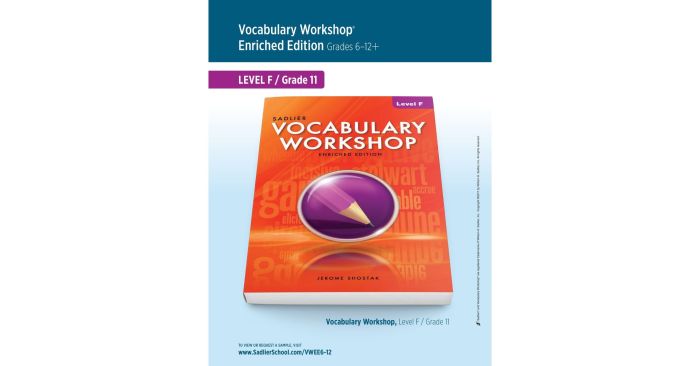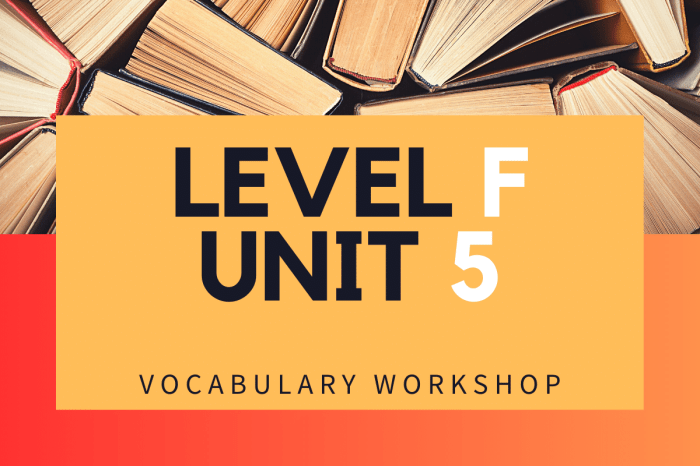Sadlier Vocabulary Workshop Level F embarks on an educational journey, empowering students with a comprehensive approach to vocabulary development, reading comprehension, and writing proficiency. This program fosters a deep understanding of words, their meanings, and their application in various contexts.
Through engaging exercises and activities, Sadlier Vocabulary Workshop Level F cultivates a strong vocabulary foundation, essential for effective communication and academic success. Students will explore word study skills, reading comprehension strategies, and writing applications, equipping them with the tools to excel in their academic pursuits and beyond.
Vocabulary Development: Sadlier Vocabulary Workshop Level F

Vocabulary development is a crucial aspect of Sadlier Vocabulary Workshop Level F. The program introduces students to a wide range of new words, expanding their linguistic repertoire and enhancing their comprehension and communication skills.
The key vocabulary concepts covered in Level F include:
- Synonyms and antonyms
- Homographs and homophones
- Multiple-meaning words
- Figurative language
- Context clues
To promote vocabulary growth, the program employs various exercises and activities, such as:
- Word lists and definitions
- Matching exercises
- Fill-in-the-blank activities
- Sentence completion exercises
- Short stories and passages with embedded vocabulary words
Vocabulary development is essential for reading comprehension and communication. A robust vocabulary enables students to understand complex texts, interpret nuanced meanings, and express themselves effectively in both written and spoken language.
Reading Comprehension Strategies

Reading comprehension strategies are techniques and approaches that readers use to understand and retain information from written texts. These strategies help readers actively engage with the text, improve their understanding, and develop their critical thinking skills.
Identifying Reading Comprehension Strategies in Sadlier Vocabulary Workshop Level F
Sadlier Vocabulary Workshop Level F introduces several reading comprehension strategies, including:
- Making Predictions:Predicting what will happen next in the text based on prior knowledge and clues in the text.
- Making Inferences:Drawing conclusions or making assumptions based on information in the text.
- Summarizing:Condensing the main points of the text into a shorter, more concise form.
- Visualizing:Creating mental images of the events, characters, and settings described in the text.
- Asking Questions:Generating questions about the text to enhance understanding and clarify confusing parts.
Applying Reading Comprehension Strategies to Different Text Types
Reading comprehension strategies can be applied to various text types, including:
- Narrative Texts:Using strategies like predicting, visualizing, and asking questions to understand the plot, characters, and setting.
- Expository Texts:Employing strategies like summarizing, inferencing, and questioning to grasp the main ideas, supporting details, and organizational structure.
- Procedural Texts:Applying strategies like predicting, visualizing, and asking questions to comprehend the steps and procedures described in the text.
Benefits of Using Reading Comprehension Strategies, Sadlier vocabulary workshop level f
Incorporating reading comprehension strategies into reading practice offers numerous benefits, including:
- Enhanced Understanding:Strategies help readers develop a deeper understanding of the text’s content and meaning.
- Improved Retention:Active engagement with the text through strategies aids in better retention of information.
- Critical Thinking Development:Strategies encourage readers to think critically, make inferences, and evaluate the text.
- Increased Reading Fluency:Strategies help readers develop fluency and automaticity in reading, leading to improved comprehension.
Word Study Skills
Sadlier Vocabulary Workshop Level F introduces a range of word study skills that enable students to analyze and understand words more effectively. These skills include:
- Etymology:Studying the origin and history of words.
- Morphology:Analyzing the structure of words, including prefixes, suffixes, and roots.
- Context Clues:Using information from the surrounding text to determine the meaning of unfamiliar words.
- Analogies:Identifying relationships between words based on their similarities and differences.
- Word Mapping:Creating visual representations of words to enhance understanding.
Importance of Word Study Skills
Word study skills are crucial for vocabulary development and spelling. By understanding the origin, structure, and relationships between words, students can expand their vocabulary and improve their spelling accuracy. Additionally, word study skills enhance students’ critical thinking and problem-solving abilities, as they learn to analyze and interpret language.
Writing Applications

The Sadlier Vocabulary Workshop Level F program provides students with a strong foundation in vocabulary and writing skills. These skills are essential for effective communication in all areas of life, including academic, professional, and personal settings.
The program’s writing applications focus on helping students develop the ability to use vocabulary and writing skills to express themselves clearly and effectively. Students learn to identify and use appropriate vocabulary in their writing, and they develop strategies for organizing and structuring their writing.
They also learn to use grammar and mechanics correctly, and they develop their ability to write in a variety of genres.
Incorporating Vocabulary and Writing Skills into Writing Exercises
There are many different ways to incorporate vocabulary and writing skills into writing exercises. One common approach is to have students write essays or stories that focus on a particular vocabulary theme. For example, students might write an essay about the different types of emotions, or they might write a story about a character who is struggling with a difficult decision.
Another approach is to have students write poems or songs that incorporate new vocabulary words. This can be a fun and creative way for students to learn new words and practice their writing skills.
Finally, teachers can also use writing exercises to help students develop their grammar and mechanics skills. For example, students might write sentences that focus on a particular grammar concept, or they might write paragraphs that incorporate a variety of punctuation marks.
Importance of Effective Vocabulary and Writing Skills
Effective vocabulary and writing skills are essential for success in all areas of life. People with strong vocabulary and writing skills are better able to communicate their ideas clearly and persuasively. They are also better able to understand and interpret the writing of others.
In academic settings, students with strong vocabulary and writing skills are more likely to succeed in their coursework. They are better able to understand their textbooks and lecture notes, and they are better able to write clear and concise essays and reports.
In professional settings, employees with strong vocabulary and writing skills are more likely to be successful in their careers. They are better able to communicate with colleagues and clients, and they are better able to write clear and persuasive proposals and reports.
In personal settings, people with strong vocabulary and writing skills are better able to express themselves clearly and effectively. They are better able to communicate their thoughts and feelings to friends and family, and they are better able to write letters and emails that are clear and concise.
General Inquiries
What is the target audience for Sadlier Vocabulary Workshop Level F?
Sadlier Vocabulary Workshop Level F is designed for students in grades 6-8.
How does Sadlier Vocabulary Workshop Level F promote vocabulary growth?
The program provides explicit instruction in vocabulary concepts, engages students in hands-on activities, and incorporates frequent opportunities for word practice and review.
What reading comprehension strategies are taught in Sadlier Vocabulary Workshop Level F?
Students learn strategies such as previewing, predicting, inferencing, and summarizing to enhance their understanding of texts.
How does Sadlier Vocabulary Workshop Level F support writing development?
The program includes writing exercises that incorporate vocabulary and word study skills, helping students apply their knowledge in real-world writing situations.